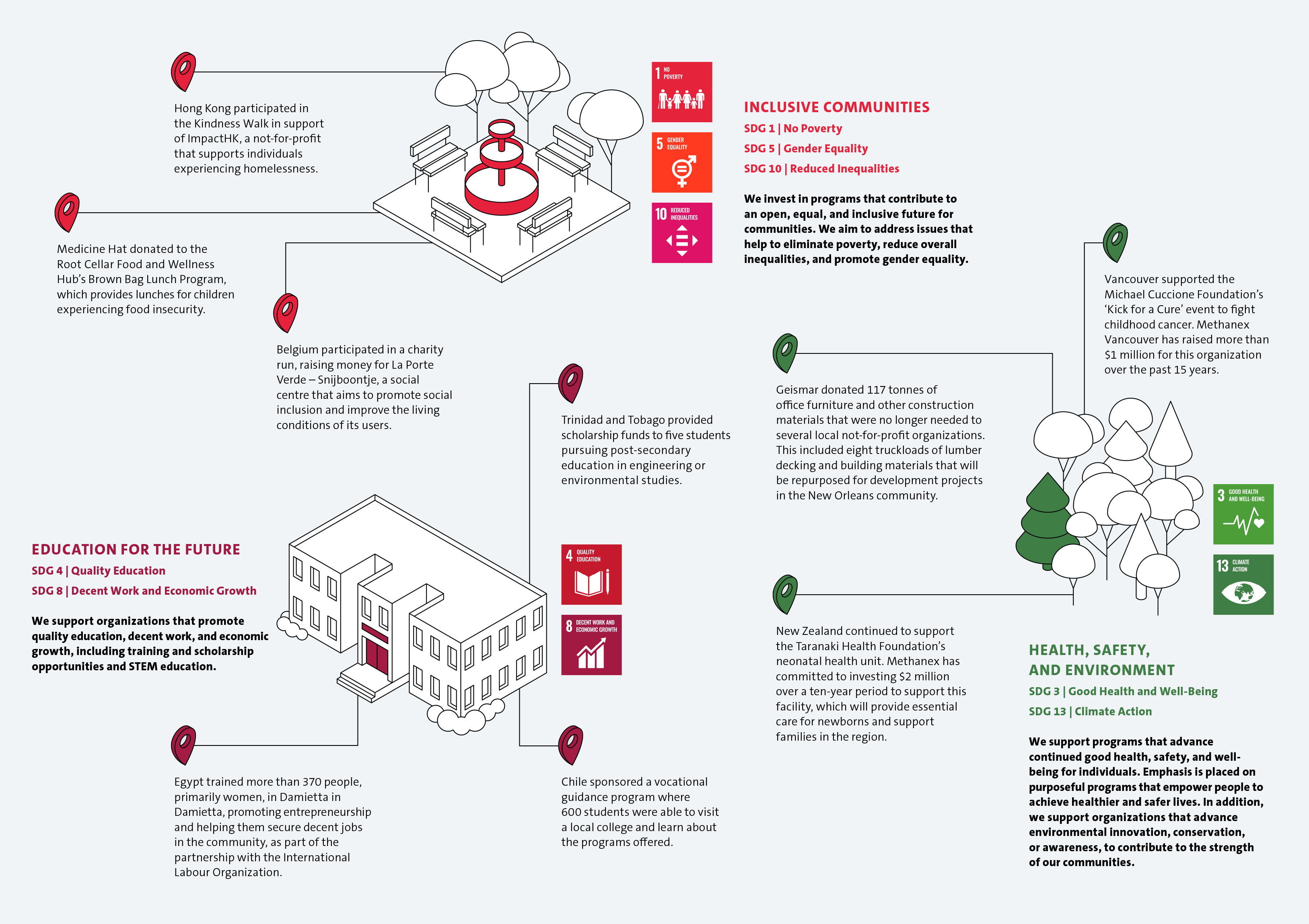As society and industry commit to decarbonization, the world faces a dilemma: while demand for petrochemicals and global transportation of goods is growing, so are the pressures to reduce or eliminate the carbon footprint of these products and activities.
As one of the world’s largest producers of methanol we have the opportunity to actively participate in the transition to a low carbon economy. Methanol is a cleaner burning fuel that can be used to improve air quality compared to traditional fuels like diesel or coal, and it can also be made from renewable sources.
At Methanex we’re committed to upholding the Responsible Care Ethic and Principles for Sustainability and developing low-carbon solutions for our customers.
Recordable injury frequency rate in 2024, our lowest rate on record
Total dual-fuel vessels in Waterfront Shipping’s 33-ship fleet
Environmental spills over the last 5 years
In community investments in 2024
Reduction in GHG intensity (tonnes of CO₂e per tonne of methanol) since 2019, towards our target of a 10 per cent reduction
→ Reduce Scope 1 and Scope 2 GHG emission intensity from manufacturing by 10 per cent by 2030 from 2019 levels.
→ Continue to refine our Scope 3 emissions data for material sources.
→ Target 97 per cent or higher average overall reliability of our plants in operation.
→ Advance at least one low-carbon project into FEED (Front End Engineering and Design) in 2025.
→ Execute at least one RNG contract and one offtake agreement for low-carbon methanol in 2025.
→ Sign low-carbon methanol sales contracts for at least 25,000 tonnes in 2025, with at least 10,000 tonnes of low carbon sales in 2025.
→ Achieve zero significant (major or serious) environmental spills annually.
→ Continually lower our five-year rolling average recordable injury rate.
→ Achieve zero Severe Injury or Fatality (SIF) incidents annually.
→ Achieve zero major incidents for process safety (i.e., Tier 1) annually.
→ Conduct corporate Responsible Care® and Operational Excellence audits at each of our manufacturing locations and marketing and logistics regions on a three-year cycle.
→ Further integrate inclusive and equitable recruitment processes and upskill leaders.
→ Progress the development of a consistent approach in reviewing diversity metrics.
→ Build engagement and momentum of new and existing employee resource groups.
→ Achieve zero reportable transport safety incidents (for methanol that we handle via Waterfront Shipping) annually.
→ Complete safety visits on 100 per cent of our time charter vessels annually.
→ Reach at least 130 organizations through our product stewardship programs.
→ All marketing and logistics regions receive antitrust training annually.
→ All employees and Methanex Board members complete ethics/Code of Business Conduct and Respectful Workplace training annually.
→ All employees complete cybersecurity training annually.
We strive to be a respected and valued corporate citizen by creating positive and long-term impacts in the communities where we operate. Our Community Investment Program focuses our community giving under three pillars tied to seven United Nations Sustainable Development Goals (SDGs) where we believe we can create a positive impact. In 2024, these are some of the initiatives we supported:
To learn more, please see pages 72, 84 and 85 of our 2024 Sustainability Report.

Our fair labour practices seek to promote safe, meaningful and inclusive work for all through: i) providing competitive wages/salaries and benefits packages, ii) maintaining a culture with a strong focus on health and safety, iii) developing initiatives to support inclusion and diversity, iv) upholding human rights, providing training
As a Responsible Care Company, we are committed to promoting sustainable production and improving the environmental performance of our facilities and processes. We consistently review the value, impact, and safety of methanol, work with value-chain partners to support product stewardship and safety and disclose our environmental and social impacts in alignment with recognized reporting frameworks (SASB and TCFD).
We support the decarbonization of our company and other industries, including the global shipping industry, through investments in i) projects that can reduce GHG emissions intensity from our manufacturing process, and ii) in other technologies to produce lower-carbon methanol. We also advocate for the positive impact of methanol in the transition to a low-carbon economy.
We promote the transparent, respectful, and ethical behaviour of all employees and contractors. We set out clear expectations of such behaviour through our Codes of Business Conduct, train all employees on anti-corruption policies and procedures, and make grievance and whistleblowing mechanisms accessible to all. Additionally, we maintain a transparent Board nomination process, Board diversity policy, and executive compensation practices.